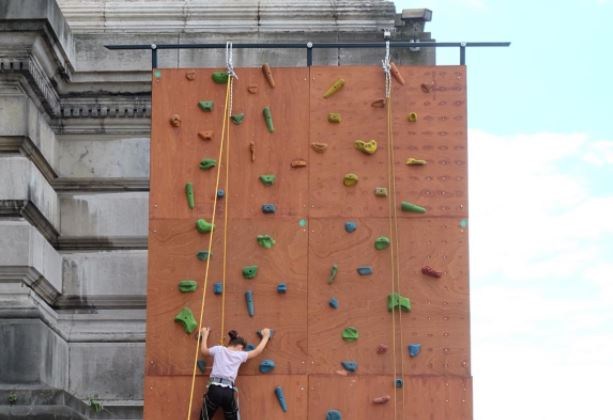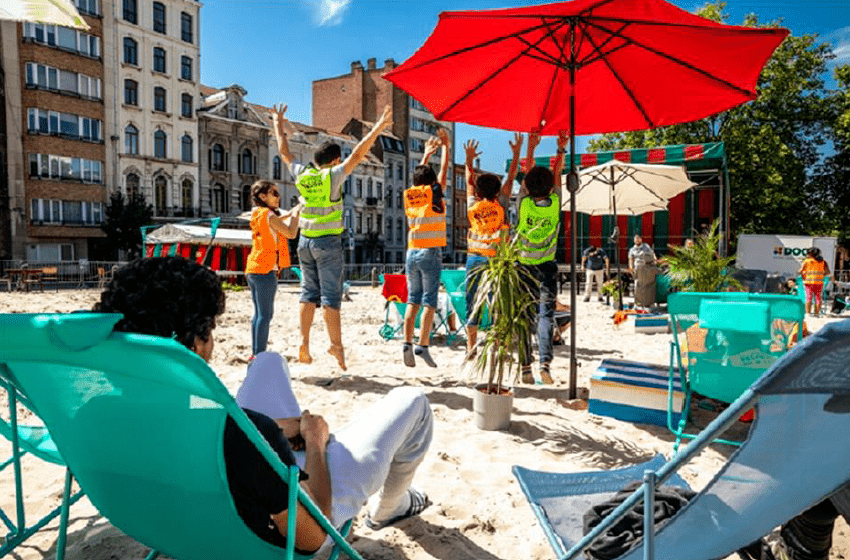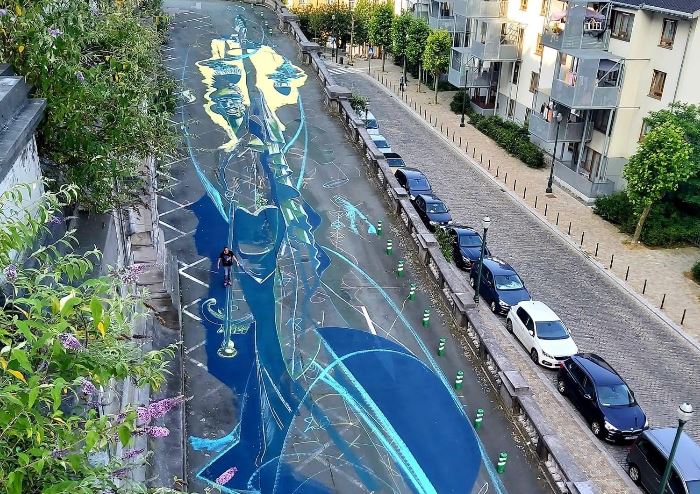As part of its efforts to revitalise the slopes of the Justice Palace after years of being used as an illegal car park, the City of Brussels is transforming them into a small urban park, hoping to bring the lively atmosphere back to the area.
After the slopes were made car-free in March of this year, the City of Brussels renamed the area 'Skieve Parck' and allocated €50,000 to five temporary summer projects in an effort to give the space back to the Marolles residents.
"Using a number of criteria, the intention was to select projects that would test a particular use for those slopes. The aim is to eventually repurpose them for good. This is only temporary, but it will help to see what works and what does not work," Ans Persoons, Brussels Alderman for Urbanism, told The Brussels Times.
The projects, which range from an urban beach over a climbing wall to a bicycle workshop, were selected by a jury made up of people from the Government Buildings Agency and the Federal Public Justice Service, as well as the coordinator of the Marolles' neighbourhood contract and someone from the neighbourhood committee.

Credit: Ans Persoons/Facebook
"It was very important to have those people from the Marolles neighbourhood in the jury because the area has a very strong associative social fabric," Persoons said. "The intention is that the residents see the projects and everything that happens on the slopes as something that belongs to them."
The slopes were made car-free by removing the illegal parking to restore the "unique heritage" of the Palace and to create a pleasant promenade, but mainly to give back such a large public space to the people of the Marolles, which is densely-populated and has very limited public space.
Reconnecting the slopes of the Justice Palace to the Marolles shows the City of Brussels' will to create accessible and quality public spaces, according to mayor Philippe Close.
"The projects selected are those which, from this summer onwards, will make the promenade nice and safe for all inhabitants of Brussels, while respecting the symbolic link between the upper city and the Marolles," he added.
At the start of this week, the street artists of First Urban Tractor started their project, called 'Pas-laid', a painting on the asphalt that was designed together with locals and neighbourhood associations.
Later, the same artists will also start building street furniture from recycled materials to create "a quality outdoor space" tailored to the slopes, as they are "an important interaction space between various groups."
Giving space back to the locals
The projects can also appeal to a very diverse audience, stressed Persoons, referring to the furniture and the painting, but also the green walking route called 'Les Jardins suspendus des Marolles' (The Hanging Gardens of the Marolles), and the 'Book of Brussels,' a life-size book that grows organically with the seasons and the needs and wishes of the neighbourhood, and also provides a wifi-hotspot.
In an effort to make the space more green, she assured that a number of techniques will be tried out, while larger projects are underway to look for a more permanent solution.
"At the same time, we are also organising a number of real activities for the residents, like the beach or the bicycle workshop, to ensure some entertainment during the summer months," Persoons said. "That way, people can come to see it, and something is happening."
She emphasised that the beach, which was also created during the summer of last year, albeit in a different space in the Marolles, is not "some big fancy event," but something much more local.

Urban beach by Foyer des Jeunes des Marolles. Credit: City of Brussels
"The intention is to highlight the slopes as a public area, and this is a first step towards the activation of that very large space," Persoons said, stressing that these projects are set up by locals, not professional organisations.
The fact that it's "just locals occupying their own space" gives the project a different dynamic, according to Persoons. "Everything happens on a smaller scale. As the locals are the ones using it, we really want to give those spaces back to them."
While the slopes are open to everyone and using the projects is completely free of charge, it is not the intention to turn the slopes into a big tourist attraction.
"This really is for the Marolles, and for everyone living there."

